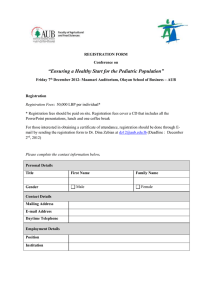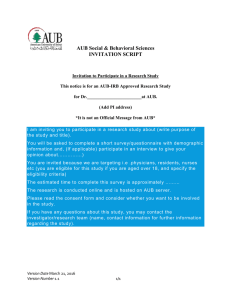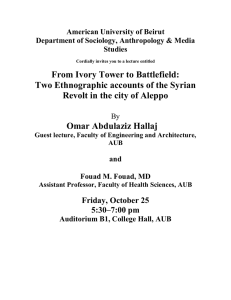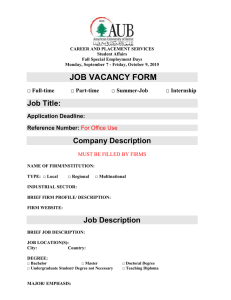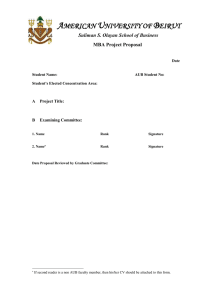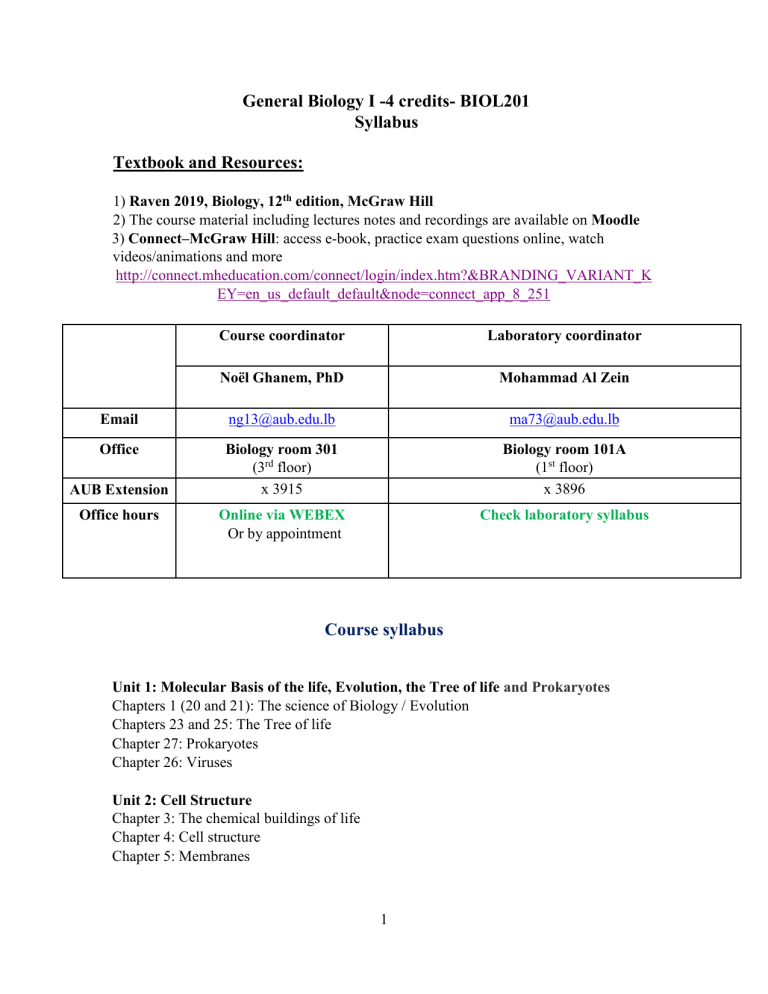
General Biology I -4 credits- BIOL201 Syllabus Textbook and Resources: 1) Raven 2019, Biology, 12th edition, McGraw Hill 2) The course material including lectures notes and recordings are available on Moodle 3) Connect–McGraw Hill: access e-book, practice exam questions online, watch videos/animations and more http://connect.mheducation.com/connect/login/index.htm?&BRANDING_VARIANT_K EY=en_us_default_default&node=connect_app_8_251 Course coordinator Laboratory coordinator Noël Ghanem, PhD Mohammad Al Zein Email ng13@aub.edu.lb ma73@aub.edu.lb Office Biology room 301 (3rd floor) x 3915 Biology room 101A (1st floor) x 3896 Online via WEBEX Or by appointment Check laboratory syllabus AUB Extension Office hours Course syllabus Unit 1: Molecular Basis of the life, Evolution, the Tree of life and Prokaryotes Chapters 1 (20 and 21): The science of Biology / Evolution Chapters 23 and 25: The Tree of life Chapter 27: Prokaryotes Chapter 26: Viruses Unit 2: Cell Structure Chapter 3: The chemical buildings of life Chapter 4: Cell structure Chapter 5: Membranes 1 Unit 3: Cell metabolism, Photosynthesis and Cell Signaling Chapter 6: Energy and metabolism Chapter 7: How cells harvest energy Chapter 8: Photosynthesis Chapter 9: Cell communication Unit 4: Reproduction, Cell Cycle Control, Chromosome Mapping Chapter 10: how cells divide Chapters 11: Sexual reproduction and meiosis Chapter 12: Patterns of inheritance Chapter 13: Chromosomes, mapping and the meiosis-inheritance connection Unit 5: DNA replication, mRNA Transcription and Protein Translation Chapter 14: DNA: the genetic material Chapter 15: Genes and how they work Protists, Fungi and the animal kingdom (Invertebrates) covered in the laboratory Online Exams Schedule Midterm 1 / Midterm 2 / Final exam: 75% (exact dates to be set in due time) Laboratory reports and quizzes: 25% 1-Class attendance is mandatory. Students who miss two or more lectures without valid justification should be dropped from the course or penalized (5-10% deduction from total grade). 2-Lab attendance is mandatory. Students who miss two or more lab sessions should be dropped from the course or penalized (5-10% deduction from total grade). 3- NO MAKE UP exams: Failure to sit for an exam results in a grade of 0. In case of an extreme medical emergency with a valid report from AUBMC, the make-up exam will be given with the final exam. 2 Proctored exams AUB regulation starting on June 1, 2020 A laptop, desktop, or similar device with a working internet connection is required for this course. Your device should have a webcam, a microphone, and speakers. You may be asked to use the webcam and audio during online lectures and/or for proctoring of exams. Exams may be administered using the Respondus Lockdown Browser and Monitor. When Respondus is required, you must download it onto a laptop or desktop computer with a supported operating system. Exams may also be proctored using video over Webex, Microsoft Teams, or Zoom. When required, you must have the right tool installed on a device with a supported operating system. By signing up for this course, you confirm that you have read and accepted the terms and provisions of AUB’s Privacy Statement. Learning outcomes The students will be able to: 1. understand the role of biology and the relevance of different biological processes to our daily life (PLOs 2 and 3a-3c) 2. use the microscope and learn the basic skills of light microscopy (PLOs 5c-5e) 3. describe the structure of the cell and learn the function of its different components (PLOs 2b, 2e and 3b) 4. compare a prokaryotic and a eukaryotic cell and highlight their differences (PLOs 2b, 2h-2j and 3b) 5. learn the basic concepts in cell metabolism and photosynthesis (PLO 4b) 6. study the processes of cell division and sexual reproduction (PLOa 2c and 2j) 7. learn the principles of genetics and solve genetic problems (PLO 2c) 8. study the molecular characteristics of nucleic acids (DNA and RNA) and how nucleic acids and protein synthesis are interrelated (PLOs 3a and 4a) 9. acquire an overview of the theory of evolution, the origin and the biodiversity of life (PLOs 2h-2j) 10. acquire an overview of the classification of living organisms and their major characteristics (PLOs 2j and 3c) 11. Test hypotheses, run simple experiments and interpret the data inside the laboratory (PLOs 5c-5e). 12. Learn how to work in a safe and efficient environment inside the laboratory (PLOs 6a-6c) 3 University policies a. Academic Integrity: Please refer to AUB Student Code of Conduct: http://www.aub.edu.lb/pnp/generaluniversitypolicies/Documents/StudentCodeCo nduct/StudentCodeConduct.pdf , in particular section 1.1, which concerns academic misconduct including cheating, plagiarism, in-class disruption, and dishonesty. Please be aware that misconduct is vigorously prosecuted and that AUB has a zero tolerance policy. Course policy is that credible evidence of cheating will result in course failure. b. Recommended Accessibility Statement to Acknowledge the Unique Learning Needs of Students with Disabilities AUB strives to make learning experiences as accessible as possible. If you anticipate or experience academic barriers due to a disability, please inform me immediately so that we help you establish reasonable accommodations and facilitate a smooth accommodations process. You are also encouraged to contact the Accessible Education Office: accessibility@aub.edu.lb; +961-1-350000, x3246; West Hall, 314. c. Non-Discrimination AUB is committed to facilitating a campus free of all forms of discrimination including sex/gender-based harassment prohibited by Title IX. The University’s non-discrimination policy applies to, and protects, all students, faculty, and staff. If you think you have experienced discrimination or harassment, including sexual misconduct, you can find information and contacts at www.aub.edu.lb/titleix . To report an incident, contact the University's Title IX Coordinator Trudi Hodges at 01-350000 ext. 2514, or titleix@aub.edu.lb . An anonymous report may be submitted online via EthicsPoint at www.aub.ethicspoint.com. 4
